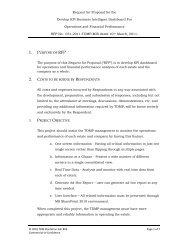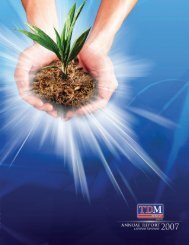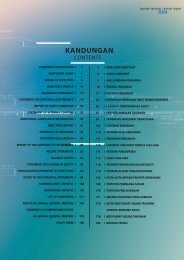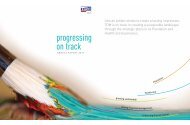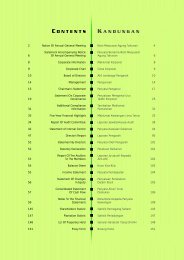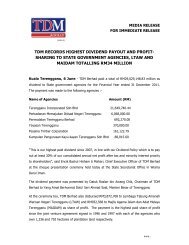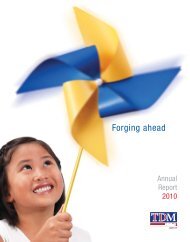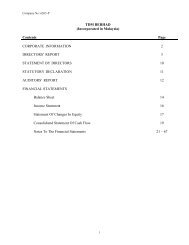2009 - TDM Berhad
2009 - TDM Berhad
2009 - TDM Berhad
- No tags were found...
Create successful ePaper yourself
Turn your PDF publications into a flip-book with our unique Google optimized e-Paper software.
<strong>TDM</strong> <strong>Berhad</strong> (6265-P) 41Waste reductionUnder <strong>TDM</strong>’s waste management policy, large amounts of mill by-products such as empty fruit bunches (EFB) and treated palm oil mill effl uent(POME) are recycled back into the fi elds as recycled organic fertiliser in compliance with Department of Environment’s standards, which alsoreduces the dependence on chemical fertilisers to further reduce costs.ProfitsThe Board and management of <strong>TDM</strong> Bhd endeavour to provide anoptimal return on investment for our shareholders and stakeholders,who include our business partners, suppliers and contractors,through sustainable growth, fi nancial excellence and strong corporategovernance. In order to meet their expectations, various initiatives havebeen undertaken, which include:Corporate GovernanceA corporate governance and risk management system whichidentifi es and mitigates risks has been put in place to actively managethe challenges faced by the Group’s businesses in the plantation,healthcare and food divisions.Dividend policyIt is the intention of the Board of Directors to enhance shareholdervalue and maximise returns to investors by adopting an attractivedividend policy which also makes provision for continuing investmentsfor growth particularly in the plantation division. This was demonstratedby the dividend payout of 10.5 sen per ordinary share in 2008 anda proposed fi rst and fi nal dividend of 4 sen per ordinary share less25% Income Tax and 9 sen per ordinary share tax exempt under thesingle-tier system for <strong>2009</strong>.Land BankIt is the policy of the management to continuously expand and diversify <strong>TDM</strong> Bhd’s source of plantation land for continued growth and this hasbeen achieved by acquiring 40,000 hectares of land in Kalimantan, Indonesia, which will be progressively developed as planted plantations forcontinued growth.



